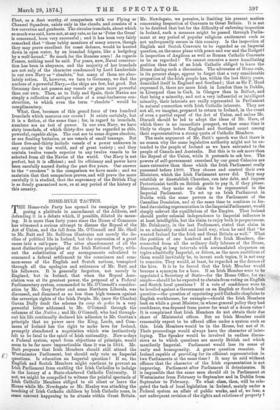HOME-RULE TACTICS.
TELE Home-rule Party has opened its campaign by pro- posing a platitude in amendment of the Address, and defending it in a debate which, if possible, diluted its mean- ing. It is more than forty years since the House of Commons has witnessed a serious attempt to discuss the Repeal of the Act of Union, and the fall from Mr. O'Connell and Mr. Sheil to Mr. Butt and Mr. Sullivan illustrates not merely the de- cline of political life in Ireland, but the conversion of a great cause into a cat's-paw. The utter abandonment of all the most distinctive principles of the Irish National Party, with- out the substitution of any arrangements calculated to commend a federal settlement to the conscience and com- mon-sense of the English and Scotch nations, transpired through all the apologies and reticences of Mr. Butt and his followers. It is generally forgotten, not merely in England, but in Ireland, that when the Repeal Asso- ciation was at its greatest power, the proposal of a Federal Parliamentary system, commended to Mr. O'Connell's consider- ation by Mr. Grey Porter and some Northern Liberals, was discussed, and dismissed as no less than high treason against the sovereign rights of the Irish People. Mr. (now Sir Charles) Gavan Duffy dealt the scheme its coup de grace in a very powerful letter addressed to Mr. O'Connell through the columns of the Nation ; and Mr. O'Connell, who had through- out his life continually declared his adhesion to Mr. Grattan's principle that no power save the King, Lords, and Com- mons of Ireland has the right to make laws for Ireland, promptly abandoned a negotiation which was instinctively felt to be fatal to the spirit of Irish nationality. Now-a-days a Federal system, apart from objections of principle, would seem to be far more impracticable than it was in 1844. Mr. Butt proposes that Irish Members should still attend the Westminster Parliament, but should only vote on Imperial questions. Is education an Imperial question ? If so, the English and Scotch Members might continue to prevent an Irish Parliament from enabling the Irish Catholics to indulge in the luxury of a State-chartered Catholic University. If not, we might be compelled to witness the painful spectacle of Irish Catholic Members obliged to sit silent or leave the House while Mr. Newdegate or Mr. Huxley was attacking the teaching of Irish Catholic children by Irish Catholic nuns, in some convent happening to be situate within Great Britain.
Mr. Newdegate, we perceive, is limiting his present motion concerning Inspection of Convents to Great Britain. It is not to be doubted that but for the difficulty of enforcing inspection in Ireland, such a measure might be passed through Parlia- ment at any period of popular religious excitement such as not unfrequently occurs in this country. Is the inspection of English and Scotch Convents to be regarded as an Imperial question, on the same plane with peace and war and the Budget? Is inspection of Anglican as well as Roman Catholic Convents to be so regarded ? We cannot conceive a more humiliating position than that of an Irish Catholic obliged to leave the House during such a discussion. The advocates of Home-rule, in its present shape, appear to forget that a very considerable proportion of the Irish people has, within the last thirty years, domiciled itself in England and Scotland ; that as Sir F. Head expressed it, there are more Irish in London than in Dublin, in Liverpool than in Cork, in Glasgow than in Belfast, and that being a minority, and not a very influential or intelligent minority, their interests are really represented in Parliament in natural connection with Irish Catholic interests. They are not all, we imagine, prepared to return to Ireland, in the event of even a partial repeal of the Act of Union, and unless Mr. Disraeli should be led to adopt the ideas of Mr. Hare, of which there is no immediate prospect, we fear some time is likely to elapse before England and Scotland count among their representatives a strong quota of Catholic Members. The main argument of Mr. Butt's speech was that there is no reason why the same legislative authority might not be ex- tended to the people of Ireland as we have entrusted to the people of Canada and Australia. But this is to ask more than the Repeal of the Union, while it pretends to ask less. The powers of self-government exercised by our great Colonies are more extensive than those which the Irish Parliament really possessed before 1800. They choose and control their own Ministers, which the Irish Parliament never did. They may establish or disestablish Churches, run into debt, and impose Protectionist tariffs on British goods to pay it, if they please. Moreover, they make no claim to be represented in the Imperial Parliament. To set up an Irish Parliament in Dublin with the same powers as the Parliament of the Canadian Dominion, and at the same time to continue to Ire- land its existing representation in the ImperialParliament, would simply subvert the equilibrium of the Empire. That Ireland should prefer colonial independence to Imperial influence is at least intelligible, but the claim to enjoy both is preposterous. Mr. Delahunty, in the last Parliament, stated that claim in in an admirably candid and lucid way, when he said that "he wanted Ireland for the Irish and Great Britain as well." What the position of one hundred and five Irish Members, dis- connected from all the ordinary daily labours of the House, descending at long intervals with accumulated eloquence on topics admittedly Imperial, or driven, as the more ambitious of them would inevitably be, to invent such topics, it is not easy to conceive. They would, at least, be regarded as the drones of the hive. It is to be feared that the Irish Member would become a synonym for a bore. If an Irish Member were to be appointed a Secretary of State—for the Home Office, for ex- ample—should he be expected to abstain from voting on English and Scotch local questions ? If a vote of confidence were to be levelled against a Government on an English or Scotch local question—the question of appointing paid Catholic chaplains to English workhouses, for example—should the Irish Members look on while a great Minister, in whose general policy they had confidence, was deposed from power for want of a dozen votes ? It is complained that Irish Members do not obtain their due share of Ministerial offices. But no Irish Member could reasonably expect to be offered office under a system such as this. Irish Members would be in the House, but not of it. Their proceedings would always have the character of inter- loping. The Speaker would be involved in endless discus- sions as to which questions are merely British and which manifestly Imperial. Parliament would lose its sense of unity and homogeneity. A graver question remains. Is Ireland capable of provid:ng for its efficient representation in two Parliaments at the same time ? It may be said without offence that the character of the Irish representation is not improving. Parliament after Parliament it deteriorates. It is impossible that the same men should sit in Parliament at Westminster from February to September and in Dublin from September to February. To what class, then, will be rele- gated the task of local legislation in Ireland, mainly under a Federal system an affair of public works, and of, we fear, a not unfrequent revision of the rights and relations of property
Any one who has listened to a lengthy political debate in an ilush corporation, and then studied the state of the streets, or the sewers, or the river that runs through the town that is governed by a political municipality, may form a fair conception. Mr. Grattan and Mr. O'Connell were right, after all. If Ireland is to be self-governed, it can only be by its own Lords and Com- mons, contentedly resigned to stay at home. But there is the rub. They do not altogether care to stay at home.
The Pall Mall Gazette complains that "a direct answer" was not made in the course of the debate, and that Ire- land was not "plainly told" that the demand could not be conceded. We differ from our contemporary. If there is a point upon which the Irish people have a right to be perverse, it is this. It is hardly ten years ago since Sir Robert Peel and Mr. Cardwell told them that the dis- establishment of the Irish Church and the legalisation of Tenant-right were things a British Parliament would never consent to. A generation before, the Duke of Wellington and Sir Robert Peel the elder (somewhat more responsible persons) said the same of Catholic Emancipation. Fate is often very vindictive against statesmen who undertake to bind the f ature. We admired particularly in Sir M. Hicks-Beach's speech a spirit quite the opposite, willing to reason, and ready to yield on the points where the demand for Home-rule has foundation. For there is no doubt whatever that the local administration, not of Ireland merely (though Ireland naturally suffers most, being the most distant and the poorest country), but of all the United Kingdom, might be decentralised with great advantage ; and that the labours of Parliament and Government might be much more efficiently achieved, if Private Bills were dealt with as Election Petitions are dealt with,—by a suitable tribunal sitting, and taking evidence on the spot. For Mr. Butt's Federal scheme we desire the most ample discussion. Thorough discussion can only show its utter impracticability. It is something more than Repeal of the Union. It is putting the British Constitution in course of liquidation.



































 Previous page
Previous page